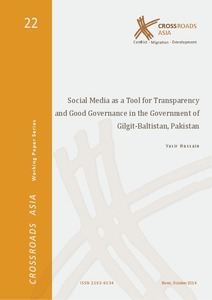Social Media as a Tool for Transparency and Good Governance in the Government of Gilgit-Baltistan, Pakistan

Social Media as a Tool for Transparency and Good Governance in the Government of Gilgit-Baltistan, Pakistan

| dc.contributor.author | Hussain, Yasir | |
| dc.contributor.editor | Baldauf, Ingeborg | |
| dc.contributor.editor | Conermann, Stephan | |
| dc.contributor.editor | Kreutzmann, Hermann | |
| dc.contributor.editor | Nadjmabadi, Shahnaz | |
| dc.contributor.editor | Reetz, Dietrich | |
| dc.contributor.editor | Schetter, Conrad | |
| dc.contributor.editor | Sökefeld, Martin | |
| dc.contributor.editor | Hornidge, Anna-Katharina | |
| dc.date.accessioned | 2016-10-05T15:05:29Z | |
| dc.date.available | 2016-10-05T15:05:29Z | |
| dc.date.issued | 10.2014 | |
| dc.identifier.uri | https://hdl.handle.net/20.500.11811/155 | |
| dc.description.abstract | This article focuses on a social media initiative of the Chief Secretary of Gilgit-Baltistan (GB) using the popular social network platform Facebook as a tool to enhance E-Government services in Gilgit-Baltistan (GB), a province-like entity in Northern Pakistan. From 6 April to 30 May 2013, the Chief Secretary, the head of the local bureaucracy of Gilgit-Baltistan, introduced a Facebook page representing his office as an attempt to provide an additional channel of public communication, to enhance government outreach, to increase transparency and to counter corruption in order to improve governance in Gilgit-Baltistan. This study has examined several models of social media use to enhance public transparency and accountability. It was shown how online information sharing technologies and social media (forums, blog platforms, social networking) enabled individuals and groups of civic activists to disseminate information about corruption in GB. Looking at the case of a micro-finance loans program discussed on the Facebook page of the Chief Secretary of GB, we can see that increased outreach and civil society participation through Facebook has considerably influenced the project planning. People demanded information about micro finance loan criteria and its disbursement and, disappointed from similar projects of the past, started to criticize this and demanded changes for what they perceived as a more just, fair, workable and equitable project planning. Through this, the project was amended according to the people’s demands. | en |
| dc.format.extent | 43 | |
| dc.language.iso | eng | |
| dc.relation.ispartofseries | Crossroads Asia Working Paper Series ; 22 | |
| dc.rights | In Copyright | |
| dc.rights.uri | http://rightsstatements.org/vocab/InC/1.0/ | |
| dc.subject | Social media | |
| dc.subject | Transparency | |
| dc.subject | Governance | |
| dc.subject | E-Governance | |
| dc.subject | Gilgit-Baltistan | |
| dc.subject | Pakistan | |
| dc.subject | ||
| dc.subject.ddc | 300 Sozialwissenschaften, Soziologie, Anthropologie | |
| dc.subject.ddc | 320 Politik | |
| dc.title | Social Media as a Tool for Transparency and Good Governance in the Government of Gilgit-Baltistan, Pakistan | |
| dc.type | Arbeitspapier | |
| dc.publisher.name | Competence Network Crossroads Asia: Conflict – Migration – Development | |
| dc.publisher.location | Bonn | |
| dc.rights.accessRights | openAccess | |
| dc.relation.eissn | 2192-6034 | |
| dc.relation.url | http://crossroads-asia.de/veroeffentlichungen/working-papers.html | |
| ulbbn.pubtype | Zweitveröffentlichung |
Dateien zu dieser Ressource
Das Dokument erscheint in:
-
Crossroads Asia Working Paper Series (37)
Working Paper des Kompetenz-Netzwerks Crossroads Asia




